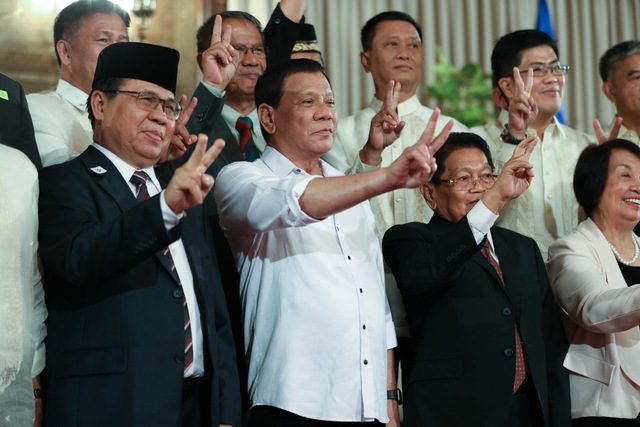SUMMARY
This is AI generated summarization, which may have errors. For context, always refer to the full article.

MANILA, Philippines (UPDATED) – President Rodrigo Duterte signed the landmark Bangsamoro Organic Law (BOL) on Thursday, July 26.
“This is to announce that the President has just signed the BOL into law,” said Presidential Spokesperson Harry Roque in a message to reporters on Thursday.
The signing came 8 days after the bicameral conference committee (bicam) finalized the bill following days of heated discussions. Duterte had certified the bill as urgent, paving the way for the speedy passage of the measure in Congress.
The Senate was the first to ratify the bicam report on the measure, ahead of Duterte’s 3rd State of the Nation Address (SONA) on Monday, July 23.
The House of Representatives failed to push through with the measure’s ratification on Monday, however, due to the leadership showdown that saw former president Gloria Macapagal Arroyo replacing Pantaleon Alvarez as House Speaker.
The House was only able to ratify the bicam report on Tuesday, July 24, and then the measure was sent to Malacañang for Duterte’s signature.
The law replaces the Autonomous Region in Muslim Mindanao (ARMM) with the new Bangsamoro Autonomous Region in Muslim Mindanao, which would have greater fiscal autonomy, a regional government, parliament, and justice system.
The region would be composed of the current ARMM – Tawi-Tawi, Sulu, Basilan, Maguindanao, and Lanao del Sur – pending a regional plebiscite.
Also included in the Bangsamoro region are 6 municipalities of Lanao del Norte and 39 barangays of Cotabato, provided that the province and their municipalities, respectively, vote to lose jurisdiction over them. These areas previously voted to be included in the ARMM, but their mother units voted against it. (READ: Duterte ends BBL impasse: Mother LGUs’ vote needed for inclusion in Bangsamoro)
The chartered cities of Cotabato and Isabela would also be included, subject to the approval of their respective registered voters in the plebiscite.
The law has an opt-in provision, allowing areas adjacent to the region to join the Bangsamoro, with a petition of at least 10% of their voters.
The law is the culmination of a peace deal signed between the Moro Islamic Liberation Front and past administrations. Former president Benigno Aquino III had wanted it passed before he stepped down, but a botched police operation in Mamasapano, Maguindanao, in 2015 derailed its passage. (READ: After Bangsamoro law, a bright yet bumpy path to peace)
Parliament, wealth, justice
The law will pave the way for the creation of the Bangsamoro government, headed by a chief minister and a ceremonial leader called a Wali.
There would also be a parliament composed of 80 members – 50% party representatives, 40% district representatives, and 10% sectoral representatives, including two reserved seats for “non-Moro indigenous peoples and settler communities.”
Despite having its own government, the Bangsamoro would not have its own military and police force, as these would still be under the national government. (READ: Bicam adopts Senate provision vs Bangsamoro firearms purchase)
The region would have its own judicial system based on the unique cultural and historical heritage of the Bangsamoro. (READ: Bicam approves creation of Shari’ah High Court in Bangsamoro)
The law grants 75-25 wealth sharing between the Bangsamoro and national governments – higher than the current 70-30 scheme under the ARMM law. This means 75% of the national internal revenue collection would go to the Bangsamoro, and 25% to the central government.
An annual block grant, pegged at a 5% share of the national internal revenue or some P59 billion, would also be automatically appropriated to the region without any conditions.
The Bangsamoro region would also primarily oversee all inland bodies of water, except for those that produce energy for other areas outside its jurisdiction. Energy-producing bodies of water, like Lake Lanao, would instead be co-managed by the region together with the Department of Energy.
The Department of National Defense (DND) on Friday, July 27, welcomed the signing as a means of ushering in “a new era of peace in Mindanao.” The DND said, “We now begin the very important step of implementing the provisions of the new law, including the decommissioning of MILF fighters, and the possible integration of qualified individuals to the AFP and PNP. “
It added, “Together with our brothers and sisters in the Bangsamoro, we will show the world that violence and terror do not have a place in our communities, and as Filipinos we can work together to achieve just and lasting peace.” – with a report from Pia Ranada/Rappler.com
Add a comment
How does this make you feel?
There are no comments yet. Add your comment to start the conversation.